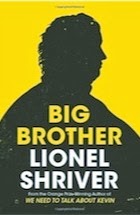This book and I were getting on so well; I had worked through the first section, which was harsh and uncomfortable with just a little bit of cruelty and revulsion thrown into the mix, and was enjoying the story of redemption and normality that made up the central section. The characters were generally coming together nicely, sure there were still toxic moments and certain relationships were causing me concern, but still I was hopeful..... Section three came along and dashed all my hopes. Like JR discovering it was all a dream, the third section turned everything on it's head, and made this really a deeply depressing (if realistic) read. Basically the whole story forms a giant cautionary tale about the dangers of food obsession. It nicely, and firmly, makes the link between control issues and 'issues' with food; and there are no bones made with criticising both eating to excess and with taking dieting to the extreme. The message seems simple; the only way to stay happy and healthy is to take everything in moderation. Carrying a few extra pounds isn't the end of the world, but becoming a 'lard-arse' as one of the characters puts it, is only going to lead to ill health and further misery. The story also casts a pretty stern eye over the culture of fame; making the point that fame for fame's sake rarely brings happiness, and that it is better to seek fulfilment through actual relationships with people.
The family dynamic in this novel feels so totally real, that it is easy to see that Shriver was drawing from personal experience. The unbreakable bond between first and middle siblings, a bond that is capable of pushing everyone else, including younger siblings, away. The sharing of in jokes about childhood and the family. The fear that once these stories are done there will be nothing else to talk about. The writing of these aspects of a sibling’s relationship is heartfelt, raw and rather painful to read. Even more uncomfortable is the reversal of the 'natural order', when the oldest child comes to rely upon their younger sibling instead of providing for them. The sense of shame at this reversal is heartbreaking at times. There are some absolutely brutal scenes; scenes where every dark, secret prejudice you may have about those around you are expressed. There are scenes where you will feel totally disgusted. Personally I cannot decide if the toilet scene or the incident with the chocolate cake revolts me more. To balance these there are some incredibly touching moments, when Pandora suddenly realises that she can actually recognise her big brother again is deeply moving.
This is a book that is painfully honest, and one to read.
The family dynamic in this novel feels so totally real, that it is easy to see that Shriver was drawing from personal experience. The unbreakable bond between first and middle siblings, a bond that is capable of pushing everyone else, including younger siblings, away. The sharing of in jokes about childhood and the family. The fear that once these stories are done there will be nothing else to talk about. The writing of these aspects of a sibling’s relationship is heartfelt, raw and rather painful to read. Even more uncomfortable is the reversal of the 'natural order', when the oldest child comes to rely upon their younger sibling instead of providing for them. The sense of shame at this reversal is heartbreaking at times. There are some absolutely brutal scenes; scenes where every dark, secret prejudice you may have about those around you are expressed. There are scenes where you will feel totally disgusted. Personally I cannot decide if the toilet scene or the incident with the chocolate cake revolts me more. To balance these there are some incredibly touching moments, when Pandora suddenly realises that she can actually recognise her big brother again is deeply moving.
This is a book that is painfully honest, and one to read.

No comments:
Post a Comment